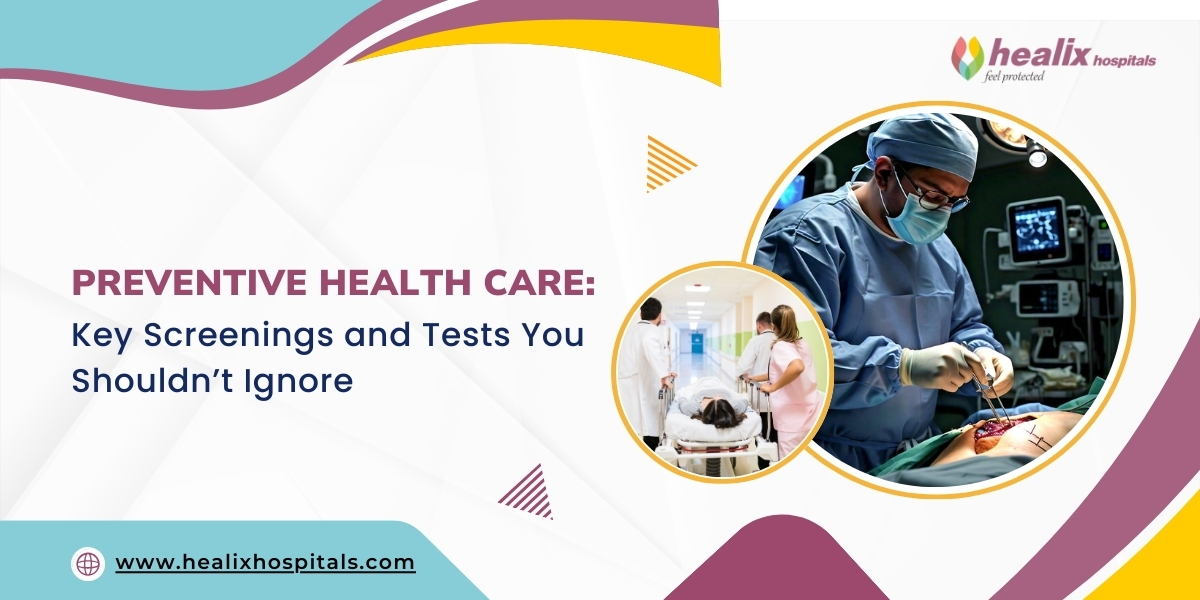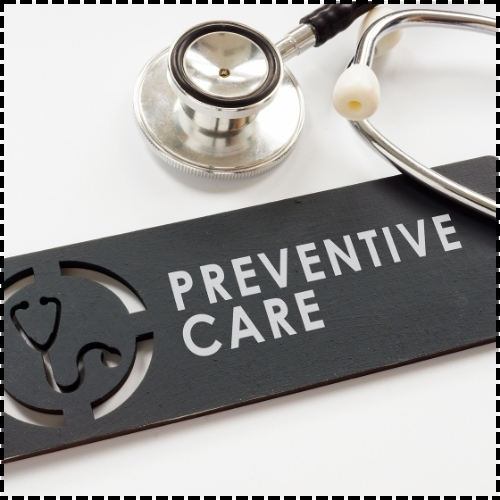

In today's fast-paced world, it's easy to overlook our health until something goes wrong. However, preventive health care is the cornerstone of maintaining long-term wellness and avoiding severe medical issues. Regular health screenings and tests play a vital role in detecting potential health problems early, often before any symptoms appear. At Healix Hospitals, we emphasize the importance of preventive care by offering a wide range of screenings and medical tests tailored to each individual's needs.
This blog will discuss essential preventive health care screenings that adults should prioritize to stay healthy, maintain well-being, and prevent chronic illnesses.
What is Preventive Health Care?
Preventive health care is a proactive approach to health that focuses on preventing diseases and identifying potential health risks before they become serious. It involves routine visits to healthcare providers, including regular health screenings and tests, lifestyle assessments, vaccinations, and early interventions.
At Healix Hospitals, we offer comprehensive preventive medical tests and screenings, empowering individuals to take control of their health and avoid the onset of life-threatening conditions.
The Importance of Preventive Health Care
The importance of preventive care cannot be overstated. Many serious health conditions, such as heart disease, diabetes, and cancer, can be detected early through regular screenings. Early detection allows for timely intervention and treatment, often reducing the severity of the disease or preventing it altogether.
By undergoing routine health checkups, you can track key health metrics like blood pressure, cholesterol levels, and glucose levels. Monitoring these factors helps in making informed lifestyle choices and maintaining optimal health. Preventive health care is not only about detecting diseases but also about promoting overall wellness through regular health screenings and tests.

Key Preventive Screenings You Shouldn’t Ignore
Here are the essential health screenings and tests that should be part of your preventive health care routine. These tests are designed to catch potential problems before they become severe, helping you lead a healthier, longer life.
1. Blood Pressure Screening
High blood pressure (hypertension) is a silent killer because it often shows no symptoms but can lead to severe health issues like heart disease, stroke, and kidney problems. Regular blood pressure checks are one of the most crucial screening tests for adults. Adults should have their blood pressure checked at least once a year during their annual medical checkups, or more frequently if recommended by a doctor.
2. Cholesterol Test (Lipid Panel)
A cholesterol test measures the levels of good (HDL) and bad (LDL) cholesterol in your blood. High cholesterol increases the risk of heart disease and stroke. It is recommended that adults undergo a cholesterol test every 4 to 6 years, or more often if they have risk factors such as obesity, smoking, or a family history of heart disease. Preventive health care guidelines suggest incorporating this test into your regular preventive medical tests.
3. Blood Glucose Test
Monitoring blood sugar levels is essential for detecting diabetes or prediabetes. A blood glucose test can help diagnose conditions early, allowing for lifestyle changes or medical interventions to prevent the disease from progressing. If you have a family history of diabetes or other risk factors, regular blood glucose tests should be part of your preventive care guidelines.
4. Cancer Screenings
Cancer screenings are critical for early detection and prevention. Several types of key preventive screenings are available depending on your age, gender, and risk factors:
- Mammograms: Women over 40 should have regular mammograms to screen for breast cancer.
- Pap Smear: Women should start getting Pap smears at the age of 21 to screen for cervical cancer.
- Colonoscopy: Men and women aged 50 and older should undergo colonoscopies to detect colon cancer. Depending on the results, screenings may be repeated every 5 to 10 years.
- Prostate-Specific Antigen (PSA) Test: Men over 50 should consider prostate cancer screenings, especially if they have a family history of the disease.
Cancer screenings are essential preventive care guidelines that can detect abnormalities early, making treatment more effective and improving survival rates.

5. Bone Density Test
A bone density test measures the strength and density of your bones, helping to detect osteoporosis. This is particularly important for women over 65 and men over 70. Osteoporosis often develops without any signs until a fracture occurs, making this a critical part of preventive health care for older adults.
6. Eye and Vision Tests
Regular vision tests are important to identify problems like glaucoma, cataracts, and macular degeneration, especially as you age. Routine eye exams can also detect other health issues, such as diabetes or hypertension, through changes in your eye health. Incorporating vision tests into your annual medical checkups ensures that eye health is monitored and potential issues are treated early.
7. Vaccinations
Vaccinations are an essential part of preventive health care that helps protect against infectious diseases such as influenza, pneumonia, and hepatitis. Adults should receive booster shots and stay up to date on vaccines to maintain immunity. This simple preventive measure can prevent serious illness and promote long-term health.
8. Body Mass Index (BMI) Measurement
Your BMI is an important indicator of whether you're maintaining a healthy weight. Being overweight or underweight can lead to a range of health issues, including heart disease, diabetes, and certain cancers. BMI is often calculated during routine health checkups as part of your overall preventive medical tests.
9. Skin Cancer Screening
Regular skin exams are vital for detecting skin cancer, particularly if you have a family history of the disease or spend a lot of time in the sun. Dermatologists recommend annual skin checks for individuals with risk factors, but anyone should consider this as part of their preventive care guidelines.
The Role of Annual Medical Checkups
Annual medical checkups are the foundation of preventive health care. These routine health checkups offer a comprehensive review of your health, allowing your doctor to recommend specific preventive medical tests based on your age, lifestyle, and family history. Annual medical checkups also help track ongoing health issues, monitor risk factors, and ensure that you’re up to date on essential health screenings and tests.
At Healix Hospitals, our preventive care programs are designed to provide personalized screenings and tests that address each patient’s unique needs. During your checkup, our healthcare professionals will create a preventive health plan to keep you on track with your key preventive screenings.
The Benefits of Early Detection
The goal of preventive health care is to identify potential health risks early, when they are most treatable. Early detection health screenings allow for immediate intervention, reducing the likelihood of complications and improving overall health outcomes. For example, catching high cholesterol or elevated blood sugar early can prevent heart attacks, strokes, or diabetes.
Moreover, preventive care reduces long-term healthcare costs by addressing health issues before they require expensive treatments or hospitalization. At Healix Hospitals, we advocate for regular screening tests for adults to promote early detection and a healthier, longer life.

Preventive Care Guidelines for Different Age Groups
Preventive health care is not one-size-fits-all. Your age, gender, family history, and personal risk factors determine which health screenings and tests are most appropriate for you. Here’s a general overview:
- Adults in Their 20s and 30s: Routine blood pressure checks, cholesterol tests, and STI screenings should be a part of your preventive health care routine. Women should start Pap smears at age 21.
- Adults in Their 40s: Begin more comprehensive health tests for disease prevention, including mammograms for women and PSA tests for men.
- Adults in Their 50s and Older: Colonoscopies, bone density tests, and vision exams should become routine. Continue regular cholesterol, glucose, and blood pressure monitoring.
No matter your age, it's important to work with your healthcare provider to develop a personalized preventive care plan.
Conclusion
Preventive health care is one of the most effective ways to maintain long-term wellness, prevent serious diseases, and ensure a higher quality of life. By scheduling regular routine health checkups and staying vigilant with essential preventive medical tests, you can catch potential issues early and take proactive steps to maintain your health.
At Healix Hospitals, we are committed to offering the best preventive health care services through personalized screenings, expert guidance, and comprehensive medical checkups. Contact Healix Hospitals today to schedule your next checkup and take control of your health.
FAQs
Q: What is the main goal of preventive health care?
A: The main goal of preventive health care is to detect health problems early through regular health screenings and tests, helping to prevent serious illnesses and maintain overall wellness.
Q: What are some essential health screenings I should get?
A: Essential health screenings and tests include blood pressure checks, cholesterol tests, cancer screenings, and blood glucose tests, all of which help in the early detection of potential health risks.
Q: Why are annual medical checkups important?
A: Annual medical checkups are critical because they help monitor your overall health, keep track of risk factors, and ensure that you are up to date on important preventive medical tests.
Q: How often should I get preventive screenings?
A: The frequency of key preventive screenings depends on your age, family history, and risk factors, but most adults should have regular screenings during their routine health checkups.
Q: Can preventive care help in reducing healthcare costs?
A: Yes, preventive health care can reduce long-term healthcare costs by identifying and treating health issues early, preventing costly treatments and hospitalizations later on.
Also Read: Minimally Invasive Orthopedic Procedures: Faster Recovery and Less Pain – Healix Hospitals